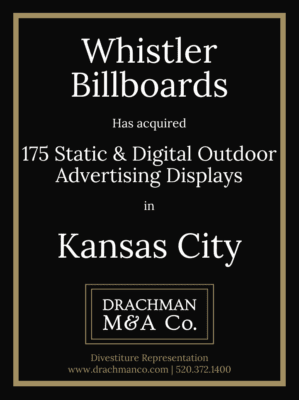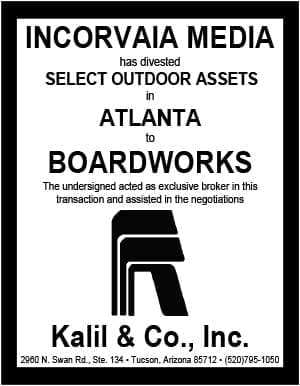 By Kevin Gleason, CEO, Adams Outdoor
By Kevin Gleason, CEO, Adams Outdoor
I read your article on 15 Tips From Three OOH Founders. I was struck by the use of the word board in describing the product we provide.
When I first entered the Billboard business in 1985 (it wasn’t called OOH until years later) I was at a national sales meeting at Naegele Outdoor Advertising in Minneapolis. During the course of the meeting, as I was listening to various market presentations, Bob Naegele stood up abruptly and interrupted the presenter by saying “why do you keep calling our inventory boards? We’re not in the goddamn lumber business. If you want to sell boards, go down to the damn lumber store.” The presenter looked up apologetically and apologized to Naegele for his mistake and went on with his presentation. Moments later, out of habit, the same presenter utilized the word board again to describe a bulletin design and Naegele responded by saying, “ if you don’t respect our industry enough to call our assets by any other name and you’re too stupid to remember what I just said two minutes ago, you’re too stupid to work here.” Naegele then proceeded to fire this individual on the spot. A harsh response but totally justified in my opinion.
Years later, thirty five to be exact, you can ask anyone at Adams my feelings on this issue and they will all tell you that we have a discipline with regards to how we discuss the media we represent. We call our inventory assets, or specifically posters, bulletins and digital displays, never boards. If we don’t respect our product why should we expect our advertisers to pay homage to the power of our medium. In todays media landscape where OOH is more relevant and powerful than other traditional forms and the big, bold beautiful nature of our assets compels the most significant advertiser to represent their brands on our inventory, isn’t it time to upgrade our thinking and our vernacular. My hat’s off to Bob Naegele for understanding this thirty five years ago.
So, Tip #16 would be to eliminate the word board when it comes to talking about our industry.
[wpforms id=”9787″]
Paid Advertisement


















Brilliant, thank you
I agree 100%! We need to eliminate ‘static’ too. That implies that other mediums are dynamic. A bulletin is a bulletin. A digital bulletin is a digital bulletin. Also ‘unit.’ Get rid of them all!
And “sign” too. Just stop. It’s a display or a bulletin, poster, whatever.
Absolutely. Our assets means a lot to us, it should be called and named accordingly.
For the businesses using out of home strategies, it is semantics. The largest market for “assets” is the +80% businesses who recognize “board, billboard, sign, space”. SpeakIng the language of the audience is understandable.
AGREE , I WAS AT THAT MEETING W/ WARREN HILTON OF OUTDOOR DISPLAYS, OUR ASSETS ARE BY FAR HIGHER AND BETTER THAN ANY OTHER , , JIM KUHN SELECTIVE STRUCTURES
Spot on Kevin…you are what you say you are. When I became CEO of what was then Patrick Media Group, I had the exact same obsession. Everyone kept saying “Patrick Billboard Company.” To which I would reply, “no, we are an out of home MEDIA company…we are more than just bulletins and posters.”I never fired anyone on the spot like Bob, but those that could not relate to the larger vision didn’t last long. We did start “fining” people for calling Patrick a “billboard” company…and fining also for referring the operations people as the “guys outback.” We donated the proceeds to charity. Yep,#16…
I remember Kevin’s dislike for the word “boards”clearly working at Adams.
It stuck with me for 20 years.
To add to Kevin’s point.
When can we stop calling radio,
Tv, Out of home and Print, traditional media? How about online and offline media?
We have digital capabilities and all media is social. With all the advancements media has made especially with technology , the word “traditional” sets us back and still holds us back against “new media” to some degree. People don’t want “old” they want “new” the perception of the name traditional is old, dated, and not relevant. This is a much bigger conversation but is overdue. Thoughts?
They are assets to those of us in the industry. To many times I have heard OOH sales people referring to our assets as assets to potential advertisers. It’s only an asset to them if it can drive their business.